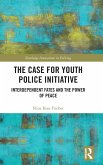Police Innovation
Herausgeber: Weisburd, David; Braga, Anthony A.
Police Innovation
Herausgeber: Weisburd, David; Braga, Anthony A.
- Gebundenes Buch
- Merkliste
- Auf die Merkliste
- Bewerten Bewerten
- Teilen
- Produkt teilen
- Produkterinnerung
- Produkterinnerung
Reviews innovations in policing over the last four decades, bringing together top policing scholars to discuss whether police should adopt these approaches.
Andere Kunden interessierten sich auch für
![Using the Police Craft to Improve Patrol Officer Decision-Making Using the Police Craft to Improve Patrol Officer Decision-Making]() James J WillisUsing the Police Craft to Improve Patrol Officer Decision-Making69,99 €
James J WillisUsing the Police Craft to Improve Patrol Officer Decision-Making69,99 €![Understanding Police Use of Force Understanding Police Use of Force]() Geoffrey P. AlpertUnderstanding Police Use of Force105,99 €
Geoffrey P. AlpertUnderstanding Police Use of Force105,99 €![The Case for Youth Police Initiative The Case for Youth Police Initiative]() Nina Rose FischerThe Case for Youth Police Initiative180,99 €
Nina Rose FischerThe Case for Youth Police Initiative180,99 €![Police and the Unarmed Black Male Crisis Police and the Unarmed Black Male Crisis]() Police and the Unarmed Black Male Crisis181,99 €
Police and the Unarmed Black Male Crisis181,99 €![Police Work and Identity Police Work and Identity]() Andrew FaullPolice Work and Identity180,99 €
Andrew FaullPolice Work and Identity180,99 €![Police Corruption Police Corruption]() Maurice PunchPolice Corruption181,99 €
Maurice PunchPolice Corruption181,99 €![Applied Police Research Applied Police Research]() Applied Police Research176,99 €
Applied Police Research176,99 €-
-
-
Reviews innovations in policing over the last four decades, bringing together top policing scholars to discuss whether police should adopt these approaches.
Hinweis: Dieser Artikel kann nur an eine deutsche Lieferadresse ausgeliefert werden.
Hinweis: Dieser Artikel kann nur an eine deutsche Lieferadresse ausgeliefert werden.
Produktdetails
- Produktdetails
- Verlag: Cambridge University Press
- Seitenzahl: 586
- Erscheinungstermin: 29. August 2019
- Englisch
- Abmessung: 235mm x 157mm x 39mm
- Gewicht: 1091g
- ISBN-13: 9781108417815
- ISBN-10: 1108417817
- Artikelnr.: 55172070
- Herstellerkennzeichnung
- Libri GmbH
- Europaallee 1
- 36244 Bad Hersfeld
- gpsr@libri.de
- Verlag: Cambridge University Press
- Seitenzahl: 586
- Erscheinungstermin: 29. August 2019
- Englisch
- Abmessung: 235mm x 157mm x 39mm
- Gewicht: 1091g
- ISBN-13: 9781108417815
- ISBN-10: 1108417817
- Artikelnr.: 55172070
- Herstellerkennzeichnung
- Libri GmbH
- Europaallee 1
- 36244 Bad Hersfeld
- gpsr@libri.de
Introduction: the context of police innovation David Weisburd and Anthony
Braga; Part I. Community Policing: 1. Advocate: community policing Wesley
Skogan; 2. Critic: community policing: a skeptical view Stephen Mastroski;
Part II. Broken Windows Policing: 3. Advocate: of 'broken windows'
criminology and criminal justice William Sousa and George Kelling; 4.
Critic: incivilities reduction policing, zero tolerance, and the retreat
from coproduction: even weaker foundations and stronger pressures Ralph
Taylor; Part III. Procedural Justice Policing: 5. Advocate: procedural
justice policing Tom Tyler and Tracey Meares; 6. Critic: the limits of
procedural justice David Thacher; Part IV. Problem-Oriented Policing: 7.
Advocate: why problem-oriented policing John Eck; 8. Critic:
problem-oriented policing: the disconnect between principles and practice
Anthony Braga and David Weisburd; Part V. Pulling Levers (Focused
Deterrence) Policing: 9. Advocate: policing and the lessons of focused
deterrence David M. Kennedy; 10. Critic: partnership, accountability, and
innovation: clarifying Boston's experience with focused deterrence Anthony
Braga; Part VI. Third-Party Policing: 11. Advocate: third-party policing
Lorraine Green Mazerolle and Janet Ransley; 12. Critic: third-party
policing: a critical view Tracey L. Meares; Part VII. Compstat: 13.
Advocate: Compstat's innovation Eli Silverman; 14. Critic: changing
everything so that everything can remain the same: Compstat and American
policing David Weisburd, Stephen Mastrofski, James J. Willis and Rosanne
Greenspan; Part VIII. Hot Spots Policing: 15. Advocate: hot spots policing
as a model for police innovation Anthony Braga and David Weisburd; 16.
Critic: the limits of hot spots policing Dennis Rosenbaum; Part IX.
Predictive Policing: 17. Advocate: predictive policing Jerry Ratcliffe; 18.
Critic predictive policing: where's the evidence Rachel Boba; Part X.
Evidence-Based / Risk-Focused Policing: 19. Advocate: evidence-based
policing for crime prevention Brandon Welsh; 20. Critic which evidence?
What knowledge? Broadening information about the police and their
interventions Jack Greene; Part XI. Technology Policing: 21. Advocate
technology in policing Barak Ariel; 22. Critic: the limits of police
technology Cynthia Lum and Chris Koper; Conclusion: police innovation and
the future of policing David Weisburd and Anthony Braga.
Braga; Part I. Community Policing: 1. Advocate: community policing Wesley
Skogan; 2. Critic: community policing: a skeptical view Stephen Mastroski;
Part II. Broken Windows Policing: 3. Advocate: of 'broken windows'
criminology and criminal justice William Sousa and George Kelling; 4.
Critic: incivilities reduction policing, zero tolerance, and the retreat
from coproduction: even weaker foundations and stronger pressures Ralph
Taylor; Part III. Procedural Justice Policing: 5. Advocate: procedural
justice policing Tom Tyler and Tracey Meares; 6. Critic: the limits of
procedural justice David Thacher; Part IV. Problem-Oriented Policing: 7.
Advocate: why problem-oriented policing John Eck; 8. Critic:
problem-oriented policing: the disconnect between principles and practice
Anthony Braga and David Weisburd; Part V. Pulling Levers (Focused
Deterrence) Policing: 9. Advocate: policing and the lessons of focused
deterrence David M. Kennedy; 10. Critic: partnership, accountability, and
innovation: clarifying Boston's experience with focused deterrence Anthony
Braga; Part VI. Third-Party Policing: 11. Advocate: third-party policing
Lorraine Green Mazerolle and Janet Ransley; 12. Critic: third-party
policing: a critical view Tracey L. Meares; Part VII. Compstat: 13.
Advocate: Compstat's innovation Eli Silverman; 14. Critic: changing
everything so that everything can remain the same: Compstat and American
policing David Weisburd, Stephen Mastrofski, James J. Willis and Rosanne
Greenspan; Part VIII. Hot Spots Policing: 15. Advocate: hot spots policing
as a model for police innovation Anthony Braga and David Weisburd; 16.
Critic: the limits of hot spots policing Dennis Rosenbaum; Part IX.
Predictive Policing: 17. Advocate: predictive policing Jerry Ratcliffe; 18.
Critic predictive policing: where's the evidence Rachel Boba; Part X.
Evidence-Based / Risk-Focused Policing: 19. Advocate: evidence-based
policing for crime prevention Brandon Welsh; 20. Critic which evidence?
What knowledge? Broadening information about the police and their
interventions Jack Greene; Part XI. Technology Policing: 21. Advocate
technology in policing Barak Ariel; 22. Critic: the limits of police
technology Cynthia Lum and Chris Koper; Conclusion: police innovation and
the future of policing David Weisburd and Anthony Braga.
Introduction: the context of police innovation David Weisburd and Anthony
Braga; Part I. Community Policing: 1. Advocate: community policing Wesley
Skogan; 2. Critic: community policing: a skeptical view Stephen Mastroski;
Part II. Broken Windows Policing: 3. Advocate: of 'broken windows'
criminology and criminal justice William Sousa and George Kelling; 4.
Critic: incivilities reduction policing, zero tolerance, and the retreat
from coproduction: even weaker foundations and stronger pressures Ralph
Taylor; Part III. Procedural Justice Policing: 5. Advocate: procedural
justice policing Tom Tyler and Tracey Meares; 6. Critic: the limits of
procedural justice David Thacher; Part IV. Problem-Oriented Policing: 7.
Advocate: why problem-oriented policing John Eck; 8. Critic:
problem-oriented policing: the disconnect between principles and practice
Anthony Braga and David Weisburd; Part V. Pulling Levers (Focused
Deterrence) Policing: 9. Advocate: policing and the lessons of focused
deterrence David M. Kennedy; 10. Critic: partnership, accountability, and
innovation: clarifying Boston's experience with focused deterrence Anthony
Braga; Part VI. Third-Party Policing: 11. Advocate: third-party policing
Lorraine Green Mazerolle and Janet Ransley; 12. Critic: third-party
policing: a critical view Tracey L. Meares; Part VII. Compstat: 13.
Advocate: Compstat's innovation Eli Silverman; 14. Critic: changing
everything so that everything can remain the same: Compstat and American
policing David Weisburd, Stephen Mastrofski, James J. Willis and Rosanne
Greenspan; Part VIII. Hot Spots Policing: 15. Advocate: hot spots policing
as a model for police innovation Anthony Braga and David Weisburd; 16.
Critic: the limits of hot spots policing Dennis Rosenbaum; Part IX.
Predictive Policing: 17. Advocate: predictive policing Jerry Ratcliffe; 18.
Critic predictive policing: where's the evidence Rachel Boba; Part X.
Evidence-Based / Risk-Focused Policing: 19. Advocate: evidence-based
policing for crime prevention Brandon Welsh; 20. Critic which evidence?
What knowledge? Broadening information about the police and their
interventions Jack Greene; Part XI. Technology Policing: 21. Advocate
technology in policing Barak Ariel; 22. Critic: the limits of police
technology Cynthia Lum and Chris Koper; Conclusion: police innovation and
the future of policing David Weisburd and Anthony Braga.
Braga; Part I. Community Policing: 1. Advocate: community policing Wesley
Skogan; 2. Critic: community policing: a skeptical view Stephen Mastroski;
Part II. Broken Windows Policing: 3. Advocate: of 'broken windows'
criminology and criminal justice William Sousa and George Kelling; 4.
Critic: incivilities reduction policing, zero tolerance, and the retreat
from coproduction: even weaker foundations and stronger pressures Ralph
Taylor; Part III. Procedural Justice Policing: 5. Advocate: procedural
justice policing Tom Tyler and Tracey Meares; 6. Critic: the limits of
procedural justice David Thacher; Part IV. Problem-Oriented Policing: 7.
Advocate: why problem-oriented policing John Eck; 8. Critic:
problem-oriented policing: the disconnect between principles and practice
Anthony Braga and David Weisburd; Part V. Pulling Levers (Focused
Deterrence) Policing: 9. Advocate: policing and the lessons of focused
deterrence David M. Kennedy; 10. Critic: partnership, accountability, and
innovation: clarifying Boston's experience with focused deterrence Anthony
Braga; Part VI. Third-Party Policing: 11. Advocate: third-party policing
Lorraine Green Mazerolle and Janet Ransley; 12. Critic: third-party
policing: a critical view Tracey L. Meares; Part VII. Compstat: 13.
Advocate: Compstat's innovation Eli Silverman; 14. Critic: changing
everything so that everything can remain the same: Compstat and American
policing David Weisburd, Stephen Mastrofski, James J. Willis and Rosanne
Greenspan; Part VIII. Hot Spots Policing: 15. Advocate: hot spots policing
as a model for police innovation Anthony Braga and David Weisburd; 16.
Critic: the limits of hot spots policing Dennis Rosenbaum; Part IX.
Predictive Policing: 17. Advocate: predictive policing Jerry Ratcliffe; 18.
Critic predictive policing: where's the evidence Rachel Boba; Part X.
Evidence-Based / Risk-Focused Policing: 19. Advocate: evidence-based
policing for crime prevention Brandon Welsh; 20. Critic which evidence?
What knowledge? Broadening information about the police and their
interventions Jack Greene; Part XI. Technology Policing: 21. Advocate
technology in policing Barak Ariel; 22. Critic: the limits of police
technology Cynthia Lum and Chris Koper; Conclusion: police innovation and
the future of policing David Weisburd and Anthony Braga.








